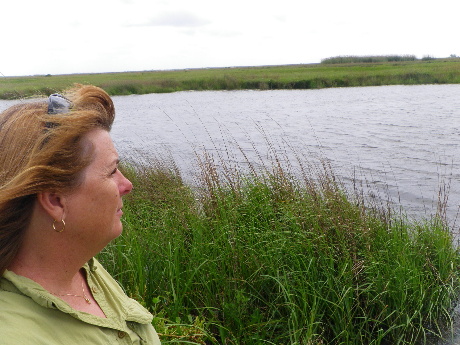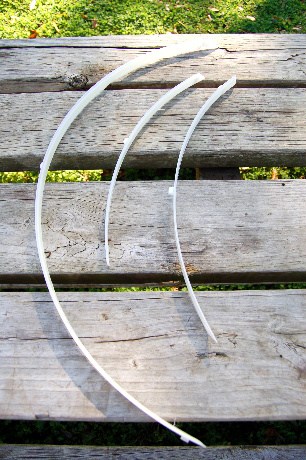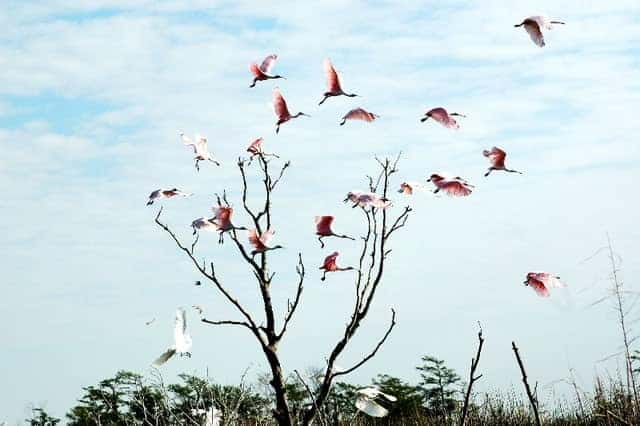How big is YOUR footprint?
So, just what is a carbon footprint, and how in the world can it be reduced? I might have a better chance of reducing my shoe size by employing Chinese foot-binding methods than reducing my carbon footprint. And just what does “going green” mean, anyway? It doesn’t have anything to do with being green around the gills or green with envy, does it?
According to one website, we have two carbon footprints—primary and secondary. The primary footprint is associated with the amount of “greenhouse gas” (CO2) emissions associated with our direct consumption of fossil fuels, which we have control over. The secondary footprint is the calculation of our indirect CO2 emissions from the whole life cycle of products we purchase and use. That includes the fuels used in the manufacture and breakdown of the products we purchase and use on a daily basis.
Simply put, CO2 emissions are a way of life in modern America, and most of the planet, actually. Since CO2 emissions are called “greenhouse gases”, why is the term “going green” applied to our reduction in use and consumption of fossil fuels? With about a quarter of a million words in the English language from which to choose, why not choose something like “going basic”?
Consider a cycling group that calls themselves the “green team”. The name connotes a reduction in use of fossil fuels by riding bikes to work as often as possible, but such is not the case. Although recreational bike riding creates no primary carbon footprint, there is still the secondary footprint to consider in the manufacture of the bike frame, the rubber tires, the helmet, polyester clothing, shoes, water bottle, etc. Get the picture?
Rather than picking on the cyclists, though, let’s consider our creditors. Certainly you’ve been solicited to “go green” by “going paperless”. Going paperless includes receiving bills via the internet and paying them the same way. They make it sound like such a good thing, but did you stop and mentally compare and contrast the carbon footprint of doing so?
Does it take less fossil fuel to use a computer than an ink pen? Do we burn more fossil fuel by mailing a bill than by receiving it by email? Granted, going paperless might save a tree, and paying bills online might reduce the fuel consumption of the US Postal Service; but consider the amount of greenhouse gas emissions created in the manufacture of all the computers in use today and the manufacture of the electric energy needed to operate them. Then ask yourself if “going green” is really all it’s cracked up to be.

Let us pause and consider for a moment all the things we do in a day that can be calculated as part of our own personal carbon footprint. After answering a brief set of multiple-choice questions on a carbon footprint site, my combined carbon footprint was calculated at 9.9 metric tons. Seems I’m already doing better than the average American, whose carbon footprint is around 20 metric tons.
To those of you who choose to ride a bike or take a hike rather than take a vehicle to the movies or out to eat, you are indeed doing your part to reduce your primary carbon footprint. For those of you who shop the local produce market, cook and eat at home, or shop at resale stores, you are greatly reducing your secondary footprint. You are all to be commended and mimicked.
Those of us who live in rural areas and can walk, bike, buy local, and grow our own food have the advantage over city folks when it comes to doing our part to reduce greenhouse gas emissions. In direct contrast, though, large cities are doing more recycling of paper, glass, and plastic than rural areas.
In my previous post, I pledged to reduce my carbon footprint to the best of my ability. In light of the recent Deepwater Horizon disaster and oil spill, that meant immediately reducing my use of gasoline by consolidating trips to town, like I did when my family was young and the budget was tight. However, while doing research for this little tirade, I was reminded that going “back to the basics” is really what reducing our use of fossil fuels and the resulting greenhouse gas emissions is all about.
There are several books in my home library that served me well when I had more time than money. Better Basics for the Home and Back to Basics are two that have been moved to the front of the shelf. If we reflect upon life in America before the Industrial Revolution and the advent of automobiles and airplanes, the answers will find you there. It might not be easy for all of us to live a simpler life, but we can all make a choice to stay home and read a book or to pay with cash rather than with plastic. We can shop for two weeks of groceries, rather than one; and we can drop our paper, plastic, and glass in the recycle bins in the grocery store parking lot. We can sort through our clothes and donate them to resale shops and shop the same stores for gently-used, secondhand items. Ride to work with a friend, or call your neighbor to ask if she needs anything before you head to the store.
All it took was a major disaster, the loss of 11 lives, and the threat of the loss of miles of much-needed wetlands to remind me that there is still so much more to life than the latest, greatest, biggest, best, sleekest and fastest.
“Going green” might not be all the buzz it’s meant to be, but going back to the basics is something I can really get buzzed about.
BW












I love this, and I love you! Bravo, lady! Good on ya.
This is a subject near and dear to my heart! Thanks for the post. Part of the year we leave in a trailer on the road so it makes some of this easy – we have to survive. We conserve the use of water, use solar power whenever possible with solar panels on our trailer, I carry and use reusable bags instead of plastic, plan driving trips to save fuel. We also buy locally whenever possible – food from farmer’s markets and stands.
We just bought a home in NM. This home is built almost totally from natural materials – local log and stone and built with local labor. We collect rain water off the roof, and have a well powered with solar.
We save all bottles and cans. We plan on using them in the future to build walls. This is a skill we learned on an Earthship internship.
Our way of life in the future will be changing. This I am sure of. I’m looking forward to hearing more replies to this post.
I find that “going paperless” (so-called) by the bank in not returning cancelled checks creates not only frustration but (probably) a bigger footprint when you take into account the time and electricity spent when you want a copy of a check (or group of checks) and have to use the computer and printer to get a copy of a check on a pice of paper about six times the size of the check.
In the past, I filed cancelled checks for various tax-deductible items in a multi-pocket folder for each year. When tax time came, I had everything at the ready.
(Incidentally, I have a room AC in the “office” room. It can be used to cool the “guest” bedroom via an opening (can be closed up) between the office and guest room.) I have fans in the rest of the house.
Is this post too long? Is it too boring? Is it too controversial? Or is it just offensive? For some reason, it’s not being read, and I can only wonder why. Please don’t be afraid to leave a comment, even if we don’t agree. It’s okay to disagree, friends!
BW
I’d guess reasons 1 and 2. Change the headline and see what happens :-).
I’ve struggled to post a response because this topic is so complex. Our nation wants to eat its cake and have it, too. If we are to deal with the nation’s carbon footprint in order to decrease our dependence on foreign oil and the need to drill off our other coasts, it will take a collective response by the people similar to that made during WWII.
For all of our small individual efforts, it’s disheartening to have mother nature negate all of that with a volcanic eruption. From this link http://www.newsweek.com/id/236776 dated April 21st, “… satellite images indicate that Eyjafjallajökull has emitted about 10,000 tons of carbon dioxide per day over the past week, a number roughly equal to the emissions of 2,000 cars per year.”
I believe a lot of people like the idea of “going green”, but only if it doesn’t inconvenience them too much. Sorting your trash and taking it to the recycling center is relatively easy and gives a person warm fuzzies. But buying their wardrobe at Goodwill or trading in a gas guzzling pickup for a shoebox-sized car? That’s going a little too far.
Another, seldom-considered, aspect of going green or going basic or going local is the impact on the economy. Consider this: if you shop only or mainly at farmers’ markets, local dairies, u-pick-em mom and pop farms, eat what meat you can kill or buy from a local cattleman, you’ll put not only grocery store workers out of a job, but the suppliers, distributors, manufacturers, and growers, too.
Stop buying new clothes and cars, stop going to the movies and on out of town vacations, don’t replace tvs and computers, and on and on. Well, you get the picture.
Taken to the extreme: the U.S. economy is based on consumption. The way to reduce the carbon footprint in a major way is to stop the production of the things we consume. The only way to stop that is to stop buying – less demand less need for supply. Then a whole lot of industries collapse, we have widespread unemployment, and our country ceases to exist as we know it.
I’m thinking you are wishing I hadn’t commented. Have a great day! 🙂
I’m not thinking that at all, dear sister. But I never meant to imply that consumerism would cease, just that there are small things that we could all do that added together might make a difference. That’s all. I remember helping someone prepare for a garage sale years ago, and she was getting rid of what I thought were great clothes. When I asked her why, she said simply, “consumerism”. That made an impression on me. Whilet I can’t brag about totally being consumerism conscious, I have been recycling clothing for a number of years out of necessity and buying at Goodwill, too. I have to get past the fact that buying second-hand and giving to “free cycle” have become trendy when I was doing it when it wasn’t cool. I have to accept that trendy or not, it’s a good thing to reuse and recycle–no matter what it is. We’re on the same page . . . . .just different paragraphs . . . .
I’m feeling pretty pessimistic today. Don’t think all of us doing small things is going to collectively be enough to solve the problem. Although it might delay the inevitable (which most of us conveniently push out of our minds because we believe it won’t happen in our lifetime), I believe we all need to do big things and I don’t think people will voluntarily give up the “I want what I want when I want it and I want to go where I want to go when I want to go there” attitude. Unless we’re forced to change, we won’t. We’ll just continue to feel entitled to the “good life” that we’ve been programmed to believe will bring us fulfillment and consume every last bit until there’s nothing left for those that come after us. But hey, the good life is nice. And sure, I’ll do my part as long as I don’t have to suffer. I mean, come on, don’t we all know that long ago we made the decision that we would let future generations bear the true suffering so that we can be comfortable and have some fun in the meantime? Why pretend? Let’s go fishing!
Exactly, Diane.
I hope you know that you posting this means that I will be hounding you about recycling EVERY piece of garbage possible from now on! Even if it means I have to take garbage bags of it from your house every Sunday afternoon and drop it off in the big recycling bin in the Civic Center parking lot!
You’re forgetting that when we lived in the city, I would drive to Schriever, off on some dead-end back road to recycle plastic and paper. Before that, I took all our newspapers to your cousin, Ash, who sold them to a paper recycler on Miss. River. Do you remember THAT??? Just like natural birth, breastfeeding, cloth diapers, clothes line, canning, and herbal remedies, I was way ahead of the trend. Just sayin’.
YES! I do have vague memories of the back of the van filled with newspapers! And I’m glad that now you’re going to get back to recycling things, and won’t have to drive to Schriever! 😉
Just want to share Offshore Technology Conference 2009.
Looks like we, the people, could learn a lot from global oil.
I believe that most people in the US don’t want to give up what they have. In some ways, I feel that way too. We have been living in luxury compared to most of the rest of the world. We really don’t know any different. I know my daughter has no idea what it means to live more simply. Hopefully you have sparked some thinking or planted some seeds with this post Wendy.
I hope so, too, Kim. Thanks.
Well, BW I’ve read this post about 5 times, and I just don’t know WHAT to write. I guess you could say my foot print is on the small side. I grow a few veggies, recycle the newspaper, and doTRY to consolidate trips, but that’s about it. I too like the “modern” comforts available to us. Oh, BTW I have that same Back To Basics ’80’s (?) book from Readers Digest. Hubby wanted to get rid of it when we donated 4 large boxes full of books to the library.
Steffi, no doubt you are on the low side of carbon emissions! I never suggested we give up our modern ways! Just conserve a little more, ya know?
I took the test and came up with 8.26. I guess I am not doing too bad but, could do better.
I recycle the items our county picks up or has drop boxes for. The grand kids collect aluminum cans all winter and sell them for their summer spending money. The newspapers go to our library recycling bins to help support it. The rest of the items go to a recycling area a few blocks away. Our normal trash pickup is less than one can each pickup day. My husband works at a recycling company that recycles cardboard and newspapers.
I raise a lot of our produce and herbs and plant flowers that are butterfly and hummingbird popular. Also very popular with the bees around here. My vehicle gets 31 MPG and the older one gets 26-28 MPG. I shop the sales for meats and groceries. We also use Goodwill a LOT!! I hate to toss out my favorite t’s and pants and I patch them until the patches need patching! LOL!! I sew, garden, can and make my own compost and we mulch the grass clippings or else bag and send them to my moms for her chickens.
We use floor fans until the temps are in the upper 80s or 90s and then we have an Energy Star rated window unit that is on energy saver. I wash/dry full loads and frequently hang stuff out to dry. I also have my water heater set on a moderate rather than hot temp. If I need extra hot water, I have a small, electric kettle that will boil in about 1 1/2 minutes.
My biggest gripe is about saving water! I don’t own a dishwasher, I have a 5 gallon bucket under the drip hole in the window unit and water my potted plants and some garden items with that water and it works better than the chlorine treated stuff from the faucets. I use a minimum amount in my bath and splurge once or twice during the really hot months with a deep water soak in that claw footed tub. But, husband thinks he requires 10″ of water every night!! Our normal water usage per month for 4 is 3,200 gallons. That is way below the norm for our area. It does go up some in the hottest months but, when I water the yard, I let the kids enjoy the sprinklers. They get to have fun and I get a decent yard.
I am working on making it a greener world.
I reduced my footprint years ago. Microwave when possible. Alternative lights.
Great weekend coming up here.
Thanks for reminding us of the basics. I hear so many people talk about how fast time is passing. That my friends is the result of the fast track we live our lives on.
CBW, you’re really hitting home with your footprint blog. Following your tips is not only “going basic” but also “going healthy”.
Have a great day.
We’ve been talking about that fast pace lately, too. You’re right. You have a great day also.
From the greeks who used arrows with pitch and set them aflame to attack incoming ships, people and oil have always had a complex relationship.
Noah used pitch to hold the ark together.
Finding methods of illumiating the evening hours consumed the imagination of of European ancestors.
Our native American ancestors had always known how to light fires.
But post April 20th, 2010…an after actually reading every power point and paper presented at Offshore Technology Conferences since Deepwater Royality Act passed Congress and was signed into law by Clinton, in 1995, my life has been transformed.
There had to be a reason after much prayer, that I paid $500.00 to attend the three day NOLA Greeen:Four Years Later Confernce in November 2009.
For more than a year I have been attempting to use my daytimer and plan a month, six months, a week, a day in advance.
But as I fall asleep praying about tomorrow’s journey, I wake up with phone calls informing me that some one has died, or is about to die, and so I pray for God to send me where he wants me the next day.
Had no clue why someone sent me an invitation to Building Resilience Workshop:Implementing Innovative, Sustainable Flood and mitigation Solutions for the GulfCoast. February 25-27 2010. God did!
Building Resilence Workshop aimed to examine how our communities have worked together from grass roots level to (Garret Grave and Governor Jindal and Obama) to be ready to live off the grid for a month or six weeks or as General Russell Honoree’ warned us…maybe a year.
General Honoree has wriiten a book SURVIVAL. He spent 37 years in the Army but says he will spend his remaining days on earth getting the people of our nation ready for when the lights go out.
Took the carbon foot print test. And although it was probably the same as Bayou Woman’s, i was not certain how to calculate energy used at Camp Dularge and in motels when other people pay for me to stay.
But every mile i drive since April 20, i pray for Maneul, the MI SWACO engineer from Eunice and his fellow mus enginner who told Houston at 3 PM, they had now entered the valley of the shadow of Death.
Sixty Minutes did a small slice with Dr. Robert Bea on Sunday night.
Nola.com has best and most accurate coverage of what has happened when well was spudded on October 14, 2009 and the blow out in March 2010…they killed the well…lost all the drill string..but saved rig. But the problem is not with Global Oil.
We have met the enemy. It is us. Consumers create huge demand or an aging infrstructure, work force, a global engineering crisis, people who cannot do math without a computer.
Investors demand profit. People in US think if they pay more than $4.00 a gallon, there is a conspircay.
From Wall Strret, to London, to opening bell in Asia..6 PM EST. trading floors, decisions are made that determine moment by moment the fate of global corp and human lives.
Good night, folks. I am turning off this computer until Sunday night or maybe Monday AM.
Why?
Why have you gone silent on the BP Gulf Oil Disaster?
Nothing of any importance since July 31, 2010.
May I offer you visit:
http://www.floridaoilspilllaw.com for update. This stuff is making thousands sick and worse is getting worser!
I am very disappointed in your lack of knowing and understanding this is a long term health problem in the making!
G. Gulick
Thank you for the link, Gulick. I will avail myself of current information, and sorry I disappoint you. BW